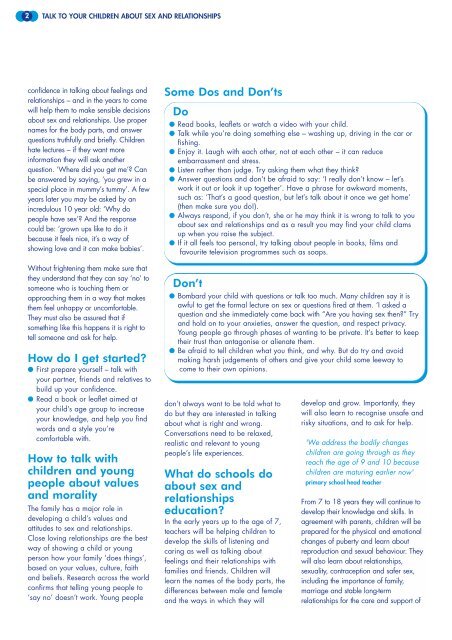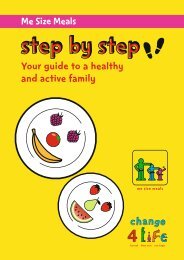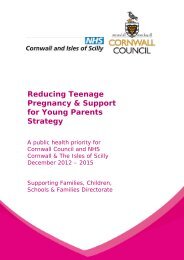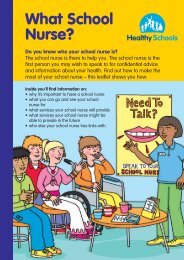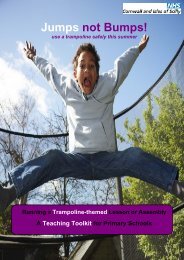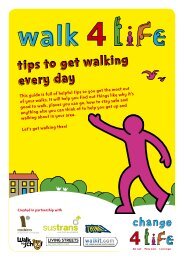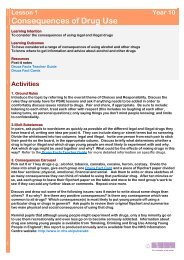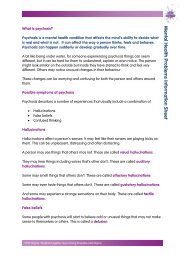Talk to your children about sex and relationships: support for parents
Talk to your children about sex and relationships: support for parents
Talk to your children about sex and relationships: support for parents
Create successful ePaper yourself
Turn your PDF publications into a flip-book with our unique Google optimized e-Paper software.
2 TALK TO YOUR CHILDREN ABOUT SEX AND RELATIONSHIPSconfidence in talking <strong>about</strong> feelings <strong>and</strong><strong>relationships</strong> – <strong>and</strong> in the years <strong>to</strong> comewill help them <strong>to</strong> make sensible decisions<strong>about</strong> <strong>sex</strong> <strong>and</strong> <strong>relationships</strong>. Use propernames <strong>for</strong> the body parts, <strong>and</strong> answerquestions truthfully <strong>and</strong> briefly. Childrenhate lectures – if they want morein<strong>for</strong>mation they will ask anotherquestion. ‘Where did you get me’? Canbe answered by saying, ‘you grew in aspecial place in mummy’s tummy’. A fewyears later you may be asked by anincredulous 10 year old: ‘Why dopeople have <strong>sex</strong>’? And the responsecould be: ‘grown ups like <strong>to</strong> do itbecause it feels nice, it’s a way ofshowing love <strong>and</strong> it can make babies’.Without frightening them make sure thatthey underst<strong>and</strong> that they can say ‘no’ <strong>to</strong>someone who is <strong>to</strong>uching them orapproaching them in a way that makesthem feel unhappy or uncom<strong>for</strong>table.They must also be assured that ifsomething like this happens it is right <strong>to</strong>tell someone <strong>and</strong> ask <strong>for</strong> help.How do I get started?● First prepare <strong>your</strong>self – talk with<strong>your</strong> partner, friends <strong>and</strong> relatives <strong>to</strong>build up <strong>your</strong> confidence.● Read a book or leaflet aimed at<strong>your</strong> child’s age group <strong>to</strong> increase<strong>your</strong> knowledge, <strong>and</strong> help you findwords <strong>and</strong> a style you’recom<strong>for</strong>table with.How <strong>to</strong> talk with<strong>children</strong> <strong>and</strong> youngpeople <strong>about</strong> values<strong>and</strong> moralityThe family has a major role indeveloping a child’s values <strong>and</strong>attitudes <strong>to</strong> <strong>sex</strong> <strong>and</strong> <strong>relationships</strong>.Close loving <strong>relationships</strong> are the bestway of showing a child or youngperson how <strong>your</strong> family ‘does things’,based on <strong>your</strong> values, culture, faith<strong>and</strong> beliefs. Research across the worldconfirms that telling young people <strong>to</strong>‘say no’ doesn’t work. Young peopleSome Dos <strong>and</strong> Don’tsDo● Read books, leaflets or watch a video with <strong>your</strong> child.● <strong>Talk</strong> while you’re doing something else – washing up, driving in the car orfishing.● Enjoy it. Laugh with each other, not at each other – it can reduceembarrassment <strong>and</strong> stress.● Listen rather than judge. Try asking them what they think?● Answer questions <strong>and</strong> don’t be afraid <strong>to</strong> say: ‘I really don’t know – let’swork it out or look it up <strong>to</strong>gether’. Have a phrase <strong>for</strong> awkward moments,such as: ‘That’s a good question, but let’s talk <strong>about</strong> it once we get home’(then make sure you do!).● Always respond, if you don’t, she or he may think it is wrong <strong>to</strong> talk <strong>to</strong> you<strong>about</strong> <strong>sex</strong> <strong>and</strong> <strong>relationships</strong> <strong>and</strong> as a result you may find <strong>your</strong> child clamsup when you raise the subject.● If it all feels <strong>to</strong>o personal, try talking <strong>about</strong> people in books, films <strong>and</strong>favourite television programmes such as soaps.Don’t● Bombard <strong>your</strong> child with questions or talk <strong>to</strong>o much. Many <strong>children</strong> say it isawful <strong>to</strong> get the <strong>for</strong>mal lecture on <strong>sex</strong> or questions fired at them. ‘I asked aquestion <strong>and</strong> she immediately came back with “Are you having <strong>sex</strong> then?” Try<strong>and</strong> hold on <strong>to</strong> <strong>your</strong> anxieties, answer the question, <strong>and</strong> respect privacy.Young people go through phases of wanting <strong>to</strong> be private. It’s better <strong>to</strong> keeptheir trust than antagonise or alienate them.● Be afraid <strong>to</strong> tell <strong>children</strong> what you think, <strong>and</strong> why. But do try <strong>and</strong> avoidmaking harsh judgements of others <strong>and</strong> give <strong>your</strong> child some leeway <strong>to</strong>come <strong>to</strong> their own opinions.don’t always want <strong>to</strong> be <strong>to</strong>ld what <strong>to</strong>do but they are interested in talking<strong>about</strong> what is right <strong>and</strong> wrong.Conversations need <strong>to</strong> be relaxed,realistic <strong>and</strong> relevant <strong>to</strong> youngpeople’s life experiences.What do schools do<strong>about</strong> <strong>sex</strong> <strong>and</strong><strong>relationships</strong>education?In the early years up <strong>to</strong> the age of 7,teachers will be helping <strong>children</strong> <strong>to</strong>develop the skills of listening <strong>and</strong>caring as well as talking <strong>about</strong>feelings <strong>and</strong> their <strong>relationships</strong> withfamilies <strong>and</strong> friends. Children willlearn the names of the body parts, thedifferences between male <strong>and</strong> female<strong>and</strong> the ways in which they willdevelop <strong>and</strong> grow. Importantly, theywill also learn <strong>to</strong> recognise unsafe <strong>and</strong>risky situations, <strong>and</strong> <strong>to</strong> ask <strong>for</strong> help.'We address the bodily changes<strong>children</strong> are going through as theyreach the age of 9 <strong>and</strong> 10 because<strong>children</strong> are maturing earlier now'primary school head teacherFrom 7 <strong>to</strong> 18 years they will continue <strong>to</strong>develop their knowledge <strong>and</strong> skills. Inagreement with <strong>parents</strong>, <strong>children</strong> will beprepared <strong>for</strong> the physical <strong>and</strong> emotionalchanges of puberty <strong>and</strong> learn <strong>about</strong>reproduction <strong>and</strong> <strong>sex</strong>ual behaviour. Theywill also learn <strong>about</strong> <strong>relationships</strong>,<strong>sex</strong>uality, contraception <strong>and</strong> safer <strong>sex</strong>,including the importance of family,marriage <strong>and</strong> stable long-term<strong>relationships</strong> <strong>for</strong> the care <strong>and</strong> <strong>support</strong> of


